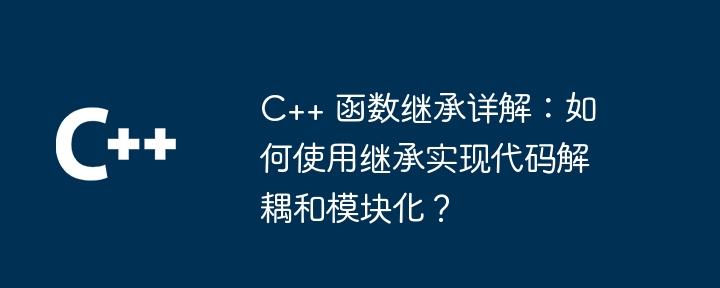
Function inheritance is a C mechanism that enables code decoupling and modularization by deriving new functions from a base class and overriding them. Benefits include: Code decoupling: Separating code for base and derived classes. Modularization: Break functionality into individual modules to improve reusability. Scalability: Add new features without modifying the original code. Code reuse: Base class functions can be used in subclasses to eliminate duplicate code.

Function inheritance is a powerful mechanism in C that allows you to start from a base Classes derive new functions, thus enabling code decoupling and modularization. This simplifies code maintenance and increases reusability and flexibility.
In C, use the override keyword to declare a derived function with the same signature as the base class function:
class Derived : public Base {
public:
void foo() override; // 派生函数
}; The override keyword ensures that the derived function overrides the base class function, rather than hiding the function.
Functional inheritance provides the following benefits:
Consider an example of a base class Shape and a derived class Circle:
class Shape {
public:
virtual double area() = 0; // 纯虚函数
};
class Circle : public Shape {
public:
double radius;
Circle(double r) : radius(r) {}
double area() override; // 覆盖 area() 函数
};Shape is an abstract class that defines a pure virtual function area(), forcing all subclasses to implement this function. Circle Derives from Shape and provides a concrete implementation of the area() function, which calculates the area of a circle.
The above is the detailed content of Detailed explanation of C++ function inheritance: How to use inheritance to achieve code decoupling and modularization?. For more information, please follow other related articles on the PHP Chinese website!
 What are the differences between c++ and c language
What are the differences between c++ and c language
 Recommended learning order for c++ and python
Recommended learning order for c++ and python
 Cost-effectiveness analysis of learning python and c++
Cost-effectiveness analysis of learning python and c++
 Is c language the same as c++?
Is c language the same as c++?
 Which is better to learn first, c language or c++?
Which is better to learn first, c language or c++?
 The difference and connection between c language and c++
The difference and connection between c language and c++
 C++ software Chinese change tutorial
C++ software Chinese change tutorial
 Cost-effectiveness analysis of learning python, java and c++
Cost-effectiveness analysis of learning python, java and c++




